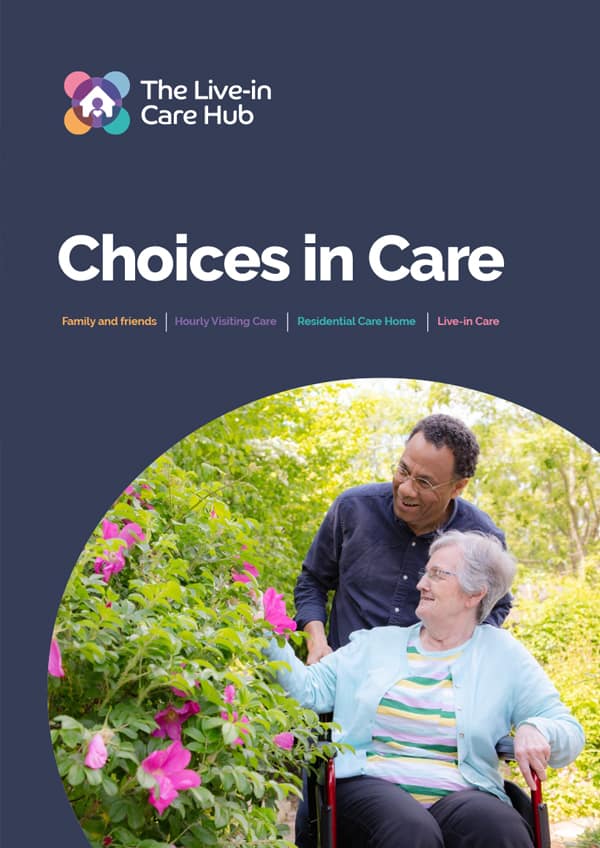Get the information you need and find live in care

Find a Provider
For Your Area
Welcome to The Live-in Care Hub. Your Trusted Resource for Live-in Care
Welcome to the Live-in Care Hub, a place dedicated to transforming the way families understand and arrange care for loved ones. We are here to guide you through the unique and life-enhancing world of live-in care—a way of providing support that allows people to stay in their own home, surrounded by the memories, routines and connections that mean the most to them.
Why Live-in Care?
Live-in care is more than just an alternative to residential care homes—it’s a choice that prioritises dignity, independence, and the continuity of home life. It’s about providing care that adapts to an individual’s needs, without uprooting them from the comfort and familiarity of their own surroundings.
Live-in care offers a way of living that prioritises your loved one’s dignity, independence, and safety—all from the comfort of home. Could you or a relative benefit from the round-the-clock support of a professional, qualified, and vetted carer? A live-in carer can assist with everyday tasks, such as:
- Helping with getting up, washing, and dressing
- Preparing a morning cup of tea or nutritious home-cooked meals
- Medication reminders and managing routines
- Companionship and escorting to appointments
- Housekeeping, laundry, and maintaining a tidy home
- Providing security and reassurance by always being there when needed
How We Can Help
We know that every family is unique, and finding the right care solution can feel overwhelming. That’s why we’re here to:
- Provide impartial advice and expert guidance on all aspects of live-in care.
- Help you navigate the many excellent live-in care agencies and find the one that’s the perfect fit for your family’s needs.
- Answer your questions with honest, straightforward information.
At the Hub, we believe that when families have access to clear, reliable information, they are empowered to make the best decisions about their care options. That’s why we’re here—to be your trusted guide, offering honest and impartial advice, all rooted in the values of compassion and respect.
A Community of Independent Experts
Our Hub is powered by the passion and expertise of independent, family-owned care businesses across the UK. As a collective, we are united by a shared commitment to delivering the highest standards of care. Together, we provide the guidance, expertise, and understanding families need when considering live-in care.
What We Offer
- Expert Guidance: Practical and unbiased advice on how live-in care works, its benefits, and what to consider when choosing the right provider.
- Resources & Insights: A wealth of information to help you navigate the complexities of care with confidence.
- A Commitment to Quality: All of our members share a passion for raising the standards of care and ensuring families receive the best possible support.
- Introductions: To our members so you can arrange live-in care when you are ready.
Your Journey Starts Here
Choosing care for a loved one is a deeply personal decision, and we’re here to make that journey easier. Whether you’re just beginning to explore your options or ready to take the next step, we’ll provide the information and reassurance you need to feel confident in your choices. Whether you’re exploring your options or ready to take the next step, The Live-in Care Hub is here to support you every step of the way. Discover how live-in care can transform the lives of you and your loved ones by offering a tailored, compassionate alternative to residential care homes.
Let us help you discover the life-changing potential of live-in care—a way of caring that keeps families together and loved ones thriving.
READ OUR MOST POPULAR BLOG
Can Someone Be Forced Into A Care Home – Know Your Rights
Find out about your rights when it comes to elderly care and how to plan ahead to ensure your wishes are met in the future.
As you get older, you might have started thinking about elderly care options. It is wise to think about your care before anything happens that means you may no longer have the ability to choose.

Download Our Latest Report
Bespoke elderly care in the form of round-the-clock live-in care can help provide a life-enhancing alternative to a care home.
With a growing elderly population comes the need for increased social care provision. Care homes are already struggling to cope with demand and the NHS struggles with bed blocking because older people don’t always have an appropriate place to go to following their recovery from illness.
The UK statistics might surprise you:
- ➤ There are over 11 million people aged over 65 in the UK
- ➤ The number of people aged 60 and over is likely to reach over 20 million by 2030
- ➤ By 2040 nearly 1 in 4 people in the UK will be aged over 65
- ➤ The number of people aged over 85 is likely to more than double within the next three decades
For these reasons, and many more, live-in care has risen in popularity as a viable alternative to a care home.
This is where a person is able to stay in their own home, cared for by a professional carer with specialist training, who is able to help them stay safe, secure and maintain the best possible quality of life.
It is also worth noting that the vast majority of people would rather be cared for in their own home. Our research has revealed that 97% of people do not want to be in care homes if they become unwell or unable to look after themselves.
For the future of care here in the UK, a live-in carer is a really important cost-effective alternative to care homes, which for many people are not the preferred choice, or even available in some instances. Elderly live in care costs a similar amount to a care home in many parts of the UK.
Read “What is Live-in Care?” to find out more about this life-enhancing approach.
Elderly Care: Tailored To Your Needs
Most residents in care homes are looked after in a ‘one size fits all’ routine where staff help all clients get dressed and ready for the day at the same time, and they are all dressed for bed at the same time, eat at the same time, and are moved into the same areas at the same time.
Of course, staff do their best to provide the best possible basic life support for residents in care homes, but it is well publicised that carers in care homes struggle to spend much quality time with their clients because of the limits placed on the time they have available.
With the right live-in carer the level of help and support is completely tailored to the needs of the client because the care is 1-to-1. Carers working in their client’s home are able to excel in their duties, offering the kind of care they were trained to provide and allowing older people to continue living life how they want to – in their own space. The basic duties of a primary carer when you choose live-in care at home 24/7 make a positive difference to the well-being of older people. Caring duties vary depending on personal needs but usually include:
- ➤ Helping clients with personal tasks like getting washed and dressed
- ➤ Cooking healthy meals for clients to meet nutritional needs
- ➤ Mobility support
- ➤ Continence care
- ➤ Helping clients get to appointments and social events in the local community
- ➤ Administering medication
- ➤ Performing light cleaning around the house
Experienced carers may also provide additional services unique to the client’s needs including, but not limited to:
- ➤ Specialist stroke care, dementia care or specific clinical care for other medical needs
- ➤ Physiotherapy
- ➤ Nursing care
- ➤ Accompaniment on trips and holidays
- ➤ Pet care
- ➤ Gardening
You can have a live in care package completely tailored to your needs and one that has a comparable care cost, or sometimes less expensive, than a care home. So live in care costs about the same but the package is completely focused on providing all the support you need for the best possible quality of life. This is person-centred care with essential companionship at it’s very best.
Get in touch with The Live-in Care Hub to find out more and start your live-in care journey. The more informed you are, the better family members will be able to make the best decision with or for a loved one.
Live-in Care At Home Is Flexible To Suit Your Needs and Way of Life
A recent survey of live-in care providers by The Live-in Care Hub has given a deeper insight into this type of care in the United Kingdom. It has revealed, as have many previous independent surveys, that care in the home by the very best carers, or care team, offers significantly better outcomes for older people for their physical and mental health and also quality of life. They are less likely to suffer falls and urinary tract infections (UTIs) and far less likely to succumb to contagious illnesses.
These better health outcomes are the result of the dedicated one-to-one care provided by an experienced live-in carer. A dedicated private carer is vigilant to signs of UTIs and, because they live in your home, are more aware of trip hazards; and simply more often in the same room to help prevent falls, which can so often lead to serious mobility problems. When it comes to cross transmission of highly contagious viruses, risks are far lower with a live-in carer because the carers are only looking after a single client in one dwelling.
For residents in care homes, where carers and other staff regularly come into close contact with numerous elderly people, the chances of illnesses being quickly transmitted to all residents are very high. We saw this tragic situation in care homes during the coronavirus pandemic at a time when seniors receiving a live in care service in their own homes had only a tiny fraction of deaths from COVID-19 compared to those in care homes.
The clear difference between a live-in carer and a care home
What is a clear difference between having a professional live-in carer and being resident in care homes is the personalised support with the flexibility to enable older people to live their lives in the way that suits them. When to eat, what to eat, when to go to bed, when to get up, what to do for entertainment, who to socialise with – these are fundamental rights for all of us. Why deny yourself those choices by moving into a residential care home just because you are that bit older and need some help with daily living?
A live-in carer provides high quality care with everything a residential or nursing home can provide – just better. Live-in home care can provide help with simple domiciliary care, personal or respite care, but also dementia or stroke care, where necessary, 24 hours a day. Tailored to you as an individual, enabling you to stay in your own home and remain part of your community. Imagine having to condense your whole life into a single room – no matter how lovely that room is? And being close to friends and neighbours you have known for a long time is far preferable to suddenly being surrounded by strangers and having to make new friends in later life.
The live-in care organisations polled in the most recent study were varied in size with some offering services to a small number of clients in a specific part of the UK, whilst others were larger organisations with thousands of clients offering their service right across the UK, including on the Isle of Man and the Channel Islands. What was clear from all these providers, regardless of their size and national reach, was that they all offered a flexible, adaptable service aimed at providing a highly-personalised service for every individual client.
A Highly-Skilled Care Service
The range of issues that live-in carers deal with is wide and varied. For many older people, having a live-in carer is as much about safety and security, as it is about live-in home care. But for other families, a live-in carer can be invaluable in managing serious medical conditions such as dementia, Parkinson’s, loss of mobility, MS and physical disabilities.
Live-in care has sometimes been confused with companion care, which is more of a ‘light’ touch to care, focused on company, cooking meals and shopping trips. Whilst these are undoubtedly part of the service on offer through a live-in carer, virtually all the organisations who responded listed ‘end of life’ care as part of what they provide.
In other words, it is high quality care that is as adaptable as it is specialist care, yet care costs are comparable to a care or nursing home. Skilled carers can live in and provide the level of care that their elderly clients need. And when care needs change then the care provided can expand to meet the clients’ needs. Where necessary in co-ordination with nursing care, although some live-in carers do have nursing experience.
This means that this type of assistance is one of the most flexible and adaptable forms of social care. It gives peace of mind to both the client and their family. Knowing elderly relatives are being looked after by a skilled, committed carer who can dedicate all their time and energy to their one client is the ideal care for older people. It ensures they can live their later years with dignity, always have companionship and know that their health and quality of life will be the best it can possibly be.
Managed or Introductory Service
Old people and their families can choose from a fully managed service (where an agency employs the carers and has a local care manager for ongoing support) or an introductory service (where an agency recruits and matches self-employed carers to you on your behalf). Either way, carers will mostly have received industry leading training that enables them to deliver the very best personalised care. There are also a small number of organisations who offer live-in nursing service, a solution that many people turn to for specialist care at the end of life.
Whatever type of service you choose for care at home you can rest assured that all carers from the providers who are members of the Live-in Care Hub will be trained, vetted professionals whose aim is to provide around the clock care tailored to your health needs, and your daily life and personal preferences.
Live-in care is part of a growing trend for seniors to ensure they have the quality of care they deserve and need for a healthy and happy later life. Although currently comprising a much smaller percentage of all senior care in the UK than care home places it has been well-established for many years. The currently increasing popularity of live-in home care is a result of growing awareness of the benefits and the affordability of this type of care and a recognition that there are better alternatives than care homes to give families peace of mind.
Email us for independent advice at hello@liveincarehub.co.uk
Ask any older person in the country to list their fears and worries about getting older and the issue which will be at the top of everyone’s list is the loss of freedom and independence. The thought of having to go into a care home worries most people precisely because they can imagine the regimented daily routines and the inability to come and go as they please.
Other major concerns include being forced to sell your home to pay for care or, indeed, being forced into a care home no matter how well-intentioned that might be.
Understandably many older people are looking for an alternative. One which is becoming ever more popular is live-in care at home.
What is live-in care at home?
Live-in home care, commonly known as live-in care, is where you have your own dedicated carer living with you to look after you. You will be matched with a professional carer who is fully trained and experienced in taking care of people. A carer can help with specific conditions such as dementia, or just to take care of your everyday needs.
Your professional carer can live with you full time 24/7 if needed or can attend your home on a part time basis. It all depends on what type of live in care you need.
Email us for independent advice or to arrange live in care at hello@liveincarehub.co.uk
Or read “Funding Live-in Care in Your Own Home” to find out more about the costs of this life-enhancing approach to caregiving for older people.
The benefits of live in care
One of the biggest advantages of receiving round-the-clock care at home comes with being able to stay in your own familiar surroundings with all your memories, familiar things and comforts that you’re used to. You sleep in your own bed as you’ve always done and have the continued privacy of your own bathroom. You can watch television when you like, take a nap in the afternoon or go out shopping whenever you want.
You maintain your independence with the freedom to enjoy doing the things you like in the comfort of your own familiar environment but knowing that someone is there to provide tailored support in whatever form best for you and your preferred lifestyle. That could be additional support with anything from everyday tasks and personal care to help you live independently, to respite care, complex care or palliative care.
Customised care which is personalised to you
When you enjoy the benefits of care at home this means you have the undivided and absolute attention of the person providing your care. Their job is to make your life easier by helping with any daily tasks such as cleaning and cooking, shopping, organising days out and even looking after your pets if you can’t.
The care-giver is also vigilant for any long term health conditions and liaising with medical personnel where needed. Should you be at risk of falls the care-giver is there to help ensure these are avoided. In fact, our Better At Home study revealed that people experience fewer falls when they have live-in care at home. Services can be customised to ensure your exact needs are met. If you need help to recover from medical procedures, remembering to take medications or personal care the help you need is available.
Find peace of mind for you and your family with live-in care, knowing you’re getting all the help you need to have a safe and independent life.
Email us for independent advice at hello@liveincarehub.co.uk
Care in your family home is a type of lice in care service that has previously been thought the preserve of a small percentage of the population, but in recent years better information and awareness has meant more people know that it is a viable option for them. Around 300 thousand people at any one time are in residential care homes in the UK and yet Live-in Care Hub research found that nearly 100% of people would rather not go into a care home if they become unwell or unable to take care of themselves.
So although care homes are an option for later life care, the chances are most people would rather stay in their own homes. It isn’t just about preferences either, as there is clear evidence that care at home is better for your health and wellbeing too.
Live-in care is a beneficial option for both the person needing care, whether that’s a spouse, partner or elderly parents, and their families. It is safe, affordable for many and allows the person to stay in their own home within a familiar community. Here are some of the key benefits :
Safety
When you need support at home, but you live on your own, you may be at risk of falls, issues with medicine schedules and at risk to yourself if you suffer from dementia. Live-in care provides help to stay safe in the home because there is always someone there with you. Carers can also suggest handy home corrections to make your home safer for you.
Home Maintenance
When you struggle to maintain a clean and tidy home your living environment can degrade, contributing to low moods and sometimes hygiene issues. Most professionals providing live in care will help with light housework, and more cleaning help can usually be arranged if needed.
Activity
With live-in care, supported activities will be encouraged daily to maintain a good level of health and independence. Help with grooming and personal care is also a part of the help provided. Specialist help like physiotherapy can also be arranged with trained professionals. Carers want to help clients be as independent as possible and support them in this aim by both organising activities and attending regular appointments with their client.
Nursing
Live-in carers with nursing experience can help with the use of medical equipment, and can help with providing specialist nursing to clients in their own home as part of an enhanced live in care package, if required.
A Healthy Diet
Nutrition can be a real issue when you become elderly, particularly if a person struggles to cook for themselves, or to feed themselves. Live-in carers can ensure that nutritional needs are met and help with tasks like cooking and feeding, helping older people to enjoy a healthy diet. It’s all part of the service.
Email The Live-in Care Hub for independent advice at hello@liveincarehub.co.uk or read some of the most Frequently Asked Questions at “Live-in Care FAQs” – or even submit a question of your own to find out more about how professional caregiving in your own home works.
Avoiding Loneliness
Loneliness is a huge problem amongst the elderly and live-in care ensures that the client has companionship every single day. Carers will also help clients to maintain relationships with friends, family and neighbours and help encourage attendance to coffee mornings and community events with people of a similar age.
Because loneliness is not just an emotional experience it is also bad for your physical health and increases the likelihood of mortality by 26%. That is more of a risk factor than obesity or lack of exercise according to The Campaign To End Loneliness and you can find out more about the impact loneliness can have on health here.
These are just some examples of how live-in care at home is better for your health and wellbeing. Of course nursing homes and care homes provide support, but it isn’t dedicated, one-to-one support. There is also a lot to be said for being able to stay in the place you love the most, avoiding disruption and the stress of change.
For care in the home with a focus on clients living their happiest and healthiest life, look into live-in care today. Email us for more information on hello@liveincarehub.co.uk
Live-in care is a popular form of care, and yet, many people still don’t know much about it. This could be for many reasons, including assumptions that it is too expensive, or perhaps not realising the many benefits it has. These following 5 facts may surprise you, and make you reconsider your future care:
People Who Have Care At Home Are Less Likely To Have A Hip Fracture
Live-in Care Hub research shows that people who have a carer at home are less likely to fall than those in residential care homes. This means a decrease in the risk of having a hip fracture, one of the most common injuries amongst older people. Hip fractures are extremely painful, they may require surgery to heal properly, and if the person is already mostly immobile, that healing process can take a very long time. Live-in care reduces the chance of such an incident occurring in the first place.
People Receiving Care at Home are Happier
The same Live-In Care Hub report revealed that the benefits of professional care at home extend beyond the physical, so much so that it showed people receiving live-in care have higher levels of happiness. Simple things like home-cooked meals, independence and maintaining a sense of freedom all contributed to this happiness.
It Saves The NHS Money & Resources
You might not realise that the benefits of having live in care at home extend beyond the person receiving the care. When a person falls, which they are more likely to do in a care home than at home, they are prone to becoming weaker and are more likely to fall again. This is a huge issue with an ever-increasing ageing population, which in financial terms is bad news for the NHS. Currently bed-blocking occurs in hospitals where they cannot effectively move a person back into care because they will either fall again, or there isn’t a suitable place for them to receive professional care. With live-in care, patients are able to move from the hospital bed into their own home secure in the knowledge that they will receive the individual care they need.
Email The Live-in Care Hub for independent advice at hello@liveincarehub.co.uk or click here to Find a Live-in Care Provider near you or a provider that covers your area. Many providers and agencies offer nationwide coverage.
Pets Mean More Than You Think
One benefit of live-in care at home is being able to be with a beloved pet. This isn’t something many people think of when they consider the consequences of moving into residential care, but it is one of the most distressing consequences. In our No Place Like Home report, it was found that 20% of elderly people would refuse to go into care without their pet. Sadly, most residential care homes don’t allow pets, which is why over 2 million people in the UK know an elderly person who has had to have their pet put to sleep because they needed to move into care. Can you imagine how emotionally traumatic and distressing that is for somebody to go through? Live-in care means the pet is able to continue living with their owner, and the owner doesn’t have to go through the trauma of rehoming, or worse, putting down their pet.
It Is Not As Expensive As You Might Think
Compared to residential care, live-in care is not as expensive as you might think and is certainly comparable. Fees are of course very much influenced by the level of live-in home care needed, so a person needing 24/7 care will incur higher fees compared to somebody needing minimal care. However, the costs are comparable to that of a care home, particularly when you’re looking at the care of a couple in their own home. It also provides a much higher level of value, because there is so much dedicated, one-to-one care.
When it comes to care in later life, it is so important to look at all of the options available, and with 97 percent of people preferring to receive care at home when becoming frail or unwell, it is certainly an excellent option.
Email The Live-in Care Hub for independent advice on hello@liveincarehub.co.uk
A live-in carer is an excellent choice for later life but it isn’t right for everyone. Here we look at 5 key questions that can help you decide if it is right for you.
Live-in care provides many benefits including:
- ➤ 1 to 1 care
- ➤ Helping clients maintain their social life, hobbies and clubs
- ➤ Ensuring that the health of the client is as optimum as possible
- ➤ Keeping clients in a familiar place
- ➤ Enabling clients to remain with partners and pets
- ➤ Providing an affordable alternative to residential care
When you are planning later life care you should look at all of the different options available to you as an educated choice is always the best choice. However, it may be that your preferred care is to stay in your own home and have a professional live-in carer but you want to feel completely sure that it will be right for you. To help you with this important decision, here are five key questions to ask yourself when considering if this type of care is suitable:
Are You Comfortable Living With Somebody Else?
Inevitably, a professional carer providing live in care services must share your home with you. If you have only lived with your partner, or lived alone for a long time, this could be a difficult adjustment. The live-in carer will be carefully selected for you but you have to first be willing to be flexible enough to have somebody living with you in your home when considering is it suitable for you.
Can You Afford It?
How much care costs is particular to your individual needs, preferences and your financial situation. Care at home is affordable compared to residential care, but in certain situations it could be more expensive than a residential care home. So do take a look at our Care Funding Guidance booklet, which will give you a lot of useful information about the sort of things you need to know if you have to pay for your own care. Just email us and we will pass your details to a maximum of three expert members who will call you for a chat about your own particular circumstances.
Email The Live-in Care Hub for impartial advice about live-in carers at hello@liveincarehub.co.uk or click here to Find a Live-in Care Provider near you or a provider that covers your area. Many providers and agencies offer a nationwide coverage.
Are Your Needs Catered For?
You may have dementia or a medical condition that calls for specific help. There are specialist carers available, but you should check that you are able to receive all the help you need at home. Sometimes nurses can come in to provide certain services alongside the day to day help from your carer making it more suitable for your circumstances.
Are You Ready To Get To Know Somebody New?
Care providers will work hard to match you with a carer you like, or place somebody with whom they believe a good relationship can develop. Your carer will want to get to know you, know what food you like, what hobbies you like and how you like things done. It may take time so be prepared for that if you want this type of care to work for you.
Does It Make You Happy?
This is the priority and should be your first consideration. Later life can be a new adventure that is just as fulfilling as other stages of your life. Look at all your care options including live in care services and residential care homes and think about which option would make you feel the happiest, because you deserve to be happy.
A live-in carer can provide an extremely supportive, caring and fulfilling option for later-life care, but think carefully about it and take your time deciding, after all it will be a big change and it can only be a success if you want it to be.
Email us for independent advice about live-in carers on hello@liveincarehub.co.uk
Searching for a live in care provider can feel like a difficult and daunting task. As this person will be living with and caring for you or a loved one it’s vitally important that you feel comfortable, safe and happy with the agency providing your care.
For more on live-in care and choosing a provider take a look at our Live-in Care Providers page.
Here are 5 key qualities to look for to ensure that you choose the best live in care agency for your loved one.
1. Attention to detail
Your live in care provider should want to be fully informed about your loved ones condition, prognosis and personal preferences. This enables them to put together a care plan which is appropriate for you. Often small details can be missed – a good care provider will ask the right questions and take time to get to know you. They’ll be adept at reading between the lines to understand exactly what it is you want and need to get out of your relationship with them.
2. Flexibility
Your live in care provider should understand that a person’s requirements are as unique as they are. Your relative may have special requests and will need assurance about certain aspects of their care. For excellent care providers this will be absolutely fine – and they’ll be more than happy to oblige and try to fit in around you rather than applying a ‘one size fits all’ methodology to everyone.
3. Good reviews
Testimonials are a very important tool in the care decision-making process. Positive reviews indicate trust and good practice concerning existing clients. Negative reviews can also flag up potential pressure points. These may or may not be relevant to you – but the more you know about what it’s actually like to experience the live in care this agency or individual provides, the better.
4. A friendly attitude
A smile and great customer service goes a very long way – especially in the care industry. Everyone you encounter should be personable, attentive and understanding. They should be interested in your thoughts and comments and happy to answer any questions you may have. You should always feel comfortable discussing your live in care arrangements – and know that you’ll be listened to and taken seriously if you have any queries or complaints.
5. Experience
The company and the person who will be providing care for your relative should have plenty of experience and knowledge under their belts. In the live-in home care profession there are certain things you can’t know unless you’ve experienced them – and the intuitive aspects of care are simply invaluable. These often come in the form of little things which can make a big difference – like the way a carer handles difficult topics, or knows when something isn’t quite right. Always ask to see credentials, qualifications and request details of past experience – good providers will be happy to oblige.
For more on live-in home care and choosing a provider take a look at our Live-in Care Providers page.









